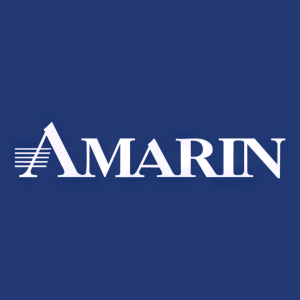New REDUCE-IT® Aspirin Analysis Presented at AHA Scientific Sessions 2025 Reinforces VASCEPA®/VAZKEPA® (Icosapent Ethyl) Reduced Cardiovascular Events in High-Risk Patients
Rhea-AI Summary
Amarin (NASDAQ: AMRN) presented a new REDUCE-IT post hoc aspirin analysis at AHA Scientific Sessions 2025 showing that icosapent ethyl significantly reduced cardiovascular events in high-risk, statin-treated patients with elevated triglycerides.
Among 8,179 participants (6,179 on aspirin), icosapent ethyl cut the primary endpoint by 28% in aspirin users (P<0.0001), with an absolute risk reduction 5.9% and NNT 17. Total primary events were reduced by 36% (RR 0.64; 95% CI 0.56–0.74). In the secondary prevention aspirin subgroup (n=4,867) total events fell 39% (RR 0.61; 95% CI 0.53–0.70).
The analysis found consistent benefit with or without aspirin and reported a safety profile in aspirin users consistent with the overall trial population.
Positive
- Primary endpoint reduced 28% in aspirin users (P<0.0001)
- Absolute risk reduction 5.9% (NNT 17)
- Total primary events reduced 36% (RR 0.64; 95% CI 0.56–0.74)
- Secondary prevention subgroup total events reduced 39% (RR 0.61; 95% CI 0.53–0.70)
Negative
- None.
News Market Reaction
On the day this news was published, AMRN gained 0.89%, reflecting a mild positive market reaction. This price movement added approximately $3M to the company's valuation, bringing the market cap to $330M at that time.
Data tracked by StockTitan Argus on the day of publication.
DUBLIN and BRIDGEWATER, N.J., Nov. 09, 2025 (GLOBE NEWSWIRE) -- Amarin Corporation plc (NASDAQ: AMRN), a company committed to advancing the science of cardiovascular care, today highlighted a new post hoc analysis of aspirin use in REDUCE-IT® reinforcing that icosapent ethyl significantly reduced cardiovascular (CV) events in high-risk patients. These findings highlight the importance of guideline-directed therapies and further validate the role of icosapent ethyl in comprehensive CV risk management in appropriate patients as studied in REDUCE-IT. This analysis was presented soon after the U.S. Food and Drug Administration (FDA) updated labeling for fenofibrate (fibrates) products that now include language on the neutral PROMINENT trial, reinforcing the lack of CV benefit when fibrates were used alongside statins for cardiovascular risk reduction; a pivotal moment that underscores the need for more effective, evidence-based approaches to residual CV risk.
“Data presented at AHA are the direct result of our continued investments in supporting our VASCEPA/VAZKEPA franchise and reaffirm our commitment to advancing the science of cardiovascular care and addressing the very real issue of residual risk in patients worldwide. Cardiovascular disease continues to be the leading cause of death globally, and far too many high-risk patients are in urgent need of protection now. That is why we remain committed to raising awareness among healthcare providers, payers, and patients about the importance of using FDA-approved therapies for cardiovascular risk reduction, such as VASCEPA® (icosapent ethyl)—proven to reduce cardiovascular events—on top of statin therapy in patients with elevated triglycerides,” said Steven Ketchum, Ph.D., EVP, President of R&D, and Chief Scientific Officer at Amarin. “The updated FDA labeling for fibrates is a critical development for clinicians seeking to reduce residual risk in their patients. The recent label update for fibrates - prompted by a citizen petition led by HealthyWomen - now clearly states that fibrates do not reduce cardiovascular risk when used in combination with statins based on the neutral PROMINENT trial safety and efficacy data where a fibrate was added to statins in patients with diabetes who had high triglycerides and low HDL-C. The revised indication limits fibrate use only to reduce triglyceride levels in adults with severe hypertriglyceridemia or for LDL-C reduction in adults with primary hyperlipidemia when statin therapy is not possible. We must continue to reinforce the message that fibrates offer no added cardiovascular benefit over statins and the importance of treating patient outcomes.”
“REDUCE-IT data continue to yield important insights into the clinical utility of icosapent ethyl and how it can reduce cardiovascular risk across diverse patient populations,” said Deepak L. Bhatt, MD, MPH, MBA, Director of the Mount Sinai Fuster Heart Hospital in New York. “The new REDUCE-IT post hoc analyses continue to support the primary outcomes datai,ii and allow us to further substantiate icosapent ethyl’s ability to reduce cardiovascular risk with or without aspirin use - an important evidence gap given the potential overlapping antiplatelet effects.iii In addition, the cardioprotective properties of icosapent ethyl are further supported by mechanistic insights into the anti-inflammatory and endothelial-protective effects of eicosapentaenoic acid.iv This important therapy has consistently demonstrated cardioprotective benefits across diverse patient populations, including those at high risk with a history of myocardial infarction or stroke, or an acute coronary syndrome population based on recent publications.v,vi,vii These findings further support the role of icosapent ethyl as a valuable option in comprehensive cardiovascular risk management.”
Key findings from the post hoc analysis are outlined below:
Efficacy of Icosapent Ethyl for Cardiovascular Risk Reduction by Aspirin Use in REDUCE-IT
A new analysis from the REDUCE-IT study reinforces the cardiovascular (CV) benefits of icosapent ethyl, a purified form of eicosapentaenoic acid, in patients with elevated triglycerides and controlled LDL-C who are at increased CV risk. The study explored outcomes among patients with and without concurrent aspirin use—an important consideration given potential overlapping antiplatelet effects.
Among 8,179 statin-treated participants, a cohort of 6,179 (
The analysis showed that icosapent ethyl provides CV protection beyond standard therapy with statins and aspirin, without incremental safety concerns, addressing a key evidence gap and supporting the role of icosapent ethyl in comprehensive CV risk management.
About Amarin
Amarin is a global pharmaceutical company committed to reducing the cardiovascular disease (CVD) burden for patients and communities and to advancing the science of cardiovascular care around the world. We own and support a global branded product approved by multiple regulatory authorities based on a track record of proven efficacy and safety and backed by robust clinical trial evidence. Our commercialization model includes a direct sales approach in the U.S. and an indirect distribution strategy internationally, through a syndicate of reputable and well-established partners with significant geographic expertise, covering over 90 markets worldwide. Our success is driven by a dedicated, talented, and highly skilled team of experts passionate about the fight against the world’s leading cause of death, CVD. The Icahn School of Medicine at Mount Sinai receives research funding from Amarin for Dr. Bhatt’s role as the Chair of REDUCE-IT.
About VASCEPA®/VAZKEPA® (icosapent ethyl) Capsules
VASCEPA (icosapent ethyl) capsules are the first prescription treatment approved by the U.S. Food and Drug Administration (FDA) comprised solely of the active ingredient, icosapent ethyl (IPE), a unique form of eicosapentaenoic acid. VASCEPA was launched in the United States in January 2020 as the first drug approved by the U.S. FDA for treatment of the studied high-risk patients with persistent cardiovascular risk despite being on statin therapy. VASCEPA was initially launched in the United States in 2013 based on the drug’s initial FDA approved indication for use as an adjunct therapy to diet to reduce triglyceride levels in adult patients with severe (≥500 mg/dL) hypertriglyceridemia. Since launch, VASCEPA has been prescribed more than twenty-five million times. VASCEPA is covered by most major medical insurance plans. In addition to the United States, VASCEPA is approved and sold in Canada, China, Australia, Lebanon, the United Arab Emirates, Saudi Arabia, Qatar, Bahrain, and Kuwait. In Europe, in March 2021 marketing authorization was granted to icosapent ethyl in the European Union for the reduction of risk of cardiovascular events in patients at high cardiovascular risk, under the brand name VAZKEPA. In April 2021 marketing authorization for VAZKEPA (icosapent ethyl) was granted in Great Britain (applying to England, Scotland and Wales). VAZKEPA (icosapent ethyl) is currently approved and sold in Europe in Sweden, Finland, England/Wales, Spain, Netherlands, Scotland, Greece, Portugal, Italy, Denmark and Austria.
United States
Indications and Limitation of Use
VASCEPA is indicated:
- As an adjunct to maximally tolerated statin therapy to reduce the risk of myocardial infarction, stroke, coronary revascularization and unstable angina requiring hospitalization in adult patients with elevated triglyceride (TG) levels (≥ 150 mg/dL) and
- established cardiovascular disease or
- diabetes mellitus and two or more additional risk factors for cardiovascular disease.
- As an adjunct to diet to reduce TG levels in adult patients with severe (≥ 500 mg/dL) hypertriglyceridemia.
The effect of VASCEPA on the risk for pancreatitis in patients with severe hypertriglyceridemia has not been determined.
Important Safety Information
- VASCEPA is contraindicated in patients with known hypersensitivity (e.g., anaphylactic reaction) to VASCEPA or any of its components.
- VASCEPA was associated with an increased risk (
3% vs2% ) of atrial fibrillation or atrial flutter requiring hospitalization in a double-blind, placebo-controlled trial. The incidence of atrial fibrillation was greater in patients with a previous history of atrial fibrillation or atrial flutter. - It is not known whether patients with allergies to fish and/or shellfish are at an increased risk of an allergic reaction to VASCEPA. Patients with such allergies should discontinue VASCEPA if any reactions occur.
- VASCEPA was associated with an increased risk (
12% vs10% ) of bleeding in a double-blind, placebo-controlled trial. The incidence of bleeding was greater in patients receiving concomitant antithrombotic medications, such as aspirin, clopidogrel, or warfarin. - Common adverse reactions in the cardiovascular outcomes trial (incidence ≥
3% and ≥1% more frequent than placebo): musculoskeletal pain (4% vs3% ), peripheral edema (7% vs5% ), constipation (5% vs4% ), gout (4% vs3% ), and atrial fibrillation (5% vs4% ). - Common adverse reactions in the hypertriglyceridemia trials (incidence >
1% more frequent than placebo): arthralgia (2% vs1% ) and oropharyngeal pain (1% vs0.3% ). - Adverse events may be reported by calling 1-855-VASCEPA or the FDA at 1-800-FDA-1088.
- Patients receiving VASCEPA and concomitant anticoagulants and/or anti-platelet agents should be monitored for bleeding.
FULL U.S. FDA-APPROVED VASCEPA PRESCRIBING INFORMATION CAN BE FOUND AT WWW.VASCEPA.COM.
Europe
For further information about the Summary of Product Characteristics (SmPC) for VAZKEPA® in Europe, please visit: https://www.ema.europa.eu/en/documents/product-information/vazkepa-epar-product-information_en.pdf
Globally, prescribing information varies; refer to the individual country product label for complete information.
Forward-Looking Statements
This press release contains forward-looking statements, which are made pursuant to the safe harbor provisions of the Private Securities Litigation Reform Act of 1995, including beliefs about Amarin’s key achievements in 2024 and the potential impact and outlook for achievements in 2025 and beyond; Amarin’s 2025 financial outlook and cash position; Amarin’s overall efforts to expand access and reimbursement to VAZKEPA across global markets; expectations regarding potential strategic collaboration and licensing agreements with third parties, including our ability to attract additional collaborators, as well as our plans and strategies for entering into potential strategic collaboration and licensing agreements and the overall potential and future success of VASCEPA/VAZKEPA and Amarin that are based on the beliefs and assumptions and information currently available to Amarin. All statements other than statements of historical fact contained in this press release are forward-looking statements. These forward-looking statements are not promises or guarantees and involve substantial risks and uncertainties. A further list and description of these risks, uncertainties and other risks associated with an investment in Amarin can be found in Amarin's filings with the U.S. Securities and Exchange Commission, including Amarin’s quarterly report on Form 10-Q for the period ending September 30, 2025 and annual report on Form 10-K for the fiscal year ended 2024. Existing and prospective investors are cautioned not to place undue reliance on these forward-looking statements, which speak only as of the date they are made. Amarin undertakes no obligation to update or revise the information contained in its forward-looking statements, whether as a result of new information, future events or circumstances or otherwise. Amarin’s forward-looking statements do not reflect the potential impact of significant transactions the company may enter into, such as mergers, acquisitions, dispositions, joint ventures or any material agreements that Amarin may enter into, amend or terminate. Investors and others should note that Amarin communicates with its investors and the public using the company website (www.amarincorp.com), the investor relations website (www.amarincorp.com/investor-relations) including but not limited to investor presentations and investor FAQs, U.S. Securities and Exchange Commission filings, press releases, public conference calls and webcasts
Availability of Other Information About Amarin
Amarin communicates with its investors and the public using the company website (www.amarincorp.com) and the investor relations website (investors.amarincorp.com), including but not limited to investor presentations and FAQs, Securities and Exchange Commission filings, press releases, public conference calls and webcasts. The information that Amarin posts on these channels and websites could be deemed to be material information. As a result, Amarin encourages investors, the media and others interested in Amarin to review the information that is posted on these channels, including the investor relations website, on a regular basis. This list of channels may be updated from time to time on Amarin’s investor relations website and may include social media channels. The contents of Amarin’s website or these channels, or any other website that may be accessed from its website or these channels, shall not be deemed incorporated by reference in any filing under the Securities Act of 1933.
Amarin Contact Information
Media Inquiries:
Tegan Berry
Amarin Corporation plc
PR@amarincorp.com
Investor Inquiries:
Bob Burrows
Western Avenue Advisers LLC
Bob.burrows.ext@amarincorp.com
Investor.relations@amarincorp.com
__________
i Bhatt DL, Steg PG, Miller M, Brinton EA, Jacobson TA, Ketchum SB, Doyle RT, Jr., Juliano RA, Jiao L, Granowitz C, Tardif JC, Ballantyne CM, for the REDUCE-IT Investigators. Cardiovascular Risk Reduction with Icosapent Ethyl for Hypertriglyceridemia. N Engl J Med 2019;380(1):11-22. DOI: 10.1056/NEJMoa1812792
ii Bhatt DL, Steg PG, Miller M, Brinton EA, Jacobson TA, Jiao L, Tardif JC, Gregson J, Pocock SJ, Ballantyne CM, on behalf of the REDUCE-IT Investigators. Reduction in First and Total Ischemic Events With Icosapent Ethyl Across Baseline Triglyceride Tertiles. J Am Coll Cardiol 2019;74(8):1159-1161. DOI: 10.1016/j.jacc.2019.06.043
iii Mourikis P, Benkhoff M, Wildeis L, et al. Icosapent ethyl reduces arterial thrombosis by inhibition of cyclooxygenase-1-induced platelet reactivity. Sci Transl Med. 2025;17(799):eado0610. doi: 10.1126/scitranslmed.ado0610.
iv Sherratt SCR, Libby P, Dawoud H, et al. Eicosapentaenoic acid improves endothelial nitric oxide bioavailability via changes in protein expression during inflammation. J Am Heart Assoc. 2024;13(14):e034076. doi: 10.1161/JAHA.123.034076.
v Gurevitz C, Bhatt DL, Giugliano RP, Steg PG, Miller M, Brinton EA, Jacobson TA, Ketchum SB, Lira Pineda A, Doyle RT, Jr, Giugliano G, Mason RP, Tardif J-C, Martens FMAC, Ballantyne CM, Budoff MJ, Gibson CM, on behalf of the REDUCE-IT Investigators. Benefit of Icosapent Ethyl Across Types and Sizes of Myocardial Infarction in REDUCE-IT. Eur J Prev Cardiol 2025. DOI: 10.1093/eurjpc/zwaf602.
vi Gaba P, Bhatt DL, Steg PG, Miller M, Brinton EA, Jacobson TA, Ketchum SB, Juliano RA, Jiao L, Doyle RT, Jr., Granowitz C, Tardif JC, Giugliano RP, Martens F, Gibson CM, Ballantyne CM, on behalf of the REDUCE-IT Investigators. Prevention of Cardiovascular Events and Mortality With Icosapent Ethyl in Patients With Prior Myocardial Infarction. J Am Coll Cardiol 2022;79(17):1660-1671. DOI: 10.1016/j.jacc.2022.02.035
vii Sayah N, Bhatt DL, Miller M, Brinton EA, Jacobson TA, Ketchum SB, Jiao L, Pineda AL, Doyle RT Jr, Tardif JC, Ballantyne CM, Steg PG. Icosapent ethyl following acute coronary syndrome: the REDUCE-IT trial. Eur Heart J. 2024 Apr 1;45(13):1173-1176. doi: 10.1093/eurheartj/ehad889. PMID: 38252107; PMCID: PMC10984562.








